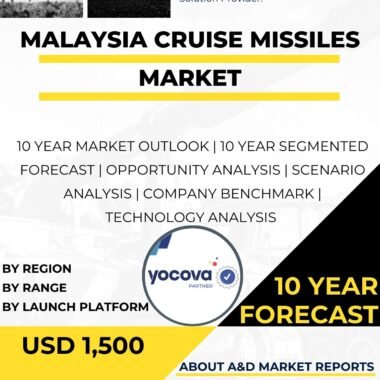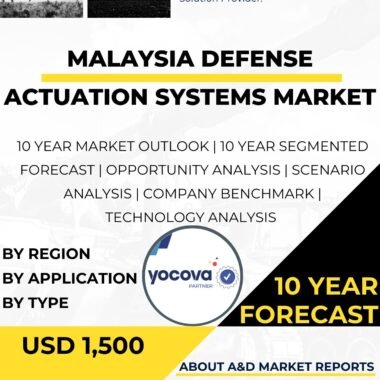Description
Overview of France’s Defense Actuation Systems Market
The France Defense Actuation Systems is a crucial and dynamic segment of the country’s defense industry, playing a significant role in the functioning and maneuverability of various defense platforms. Actuation systems convert electrical, hydraulic, or pneumatic energy into mechanical motion, allowing precise movement and control in critical equipment. France has increasingly recognized the strategic importance of these systems, especially as defense platforms grow more sophisticated and digitally integrated. From fighter jets to submarines, the performance of modern military systems relies heavily on the precision, reliability, and responsiveness of their actuation components. With growing global defense spending and technological competition, France’s actuation systems sector is positioned as a key enabler of both national defense capabilities and international exports.
Significance of Actuation Systems in Defense Platforms
The significance of France’s defense actuation systems market lies in its ability to ensure reliable and precise control of a wide range of defense platforms. These systems directly affect the agility, responsiveness, and operational efficiency of military aircraft, missiles, armored vehicles, and naval vessels. Beyond basic movement, actuation systems also contribute to safety, precision targeting, and mission success under extreme conditions. For instance, in combat situations, the performance of an aircraft or missile may hinge on split-second actuation responses. Similarly, ground vehicles navigating uneven terrain require robust actuation systems for steering and suspension to maintain combat effectiveness.
Key Players and Industry Stakeholders
Key players in France’s defense actuation systems market include government research institutions, private defense contractors, and specialized manufacturers. The French Ministry of Armed Forces, through its procurement and research arm, the Direction Générale de l’Armement (DGA), oversees strategy, acquisition, and innovation initiatives. Major defense companies such as Safran, Thales, and MBDA France have led the development of high-performance actuation systems, ranging from aircraft control actuators to missile guidance components. Research organizations and universities also contribute to R&D efforts, exploring advanced materials, control algorithms, and miniaturized designs.
Technological Advancements in Actuation Systems
Technological advancements have been pivotal in shaping the growth of France’s defense actuation systems market. Modern actuation technologies, including electro-hydraulic, electro-mechanical, and electro-pneumatic systems, offer high precision, durability, and power output across varied defense applications. Recent innovations focus on reducing system size and weight while improving reliability and energy efficiency. Advanced materials such as titanium alloys, carbon composites, and specialized lubricants enhance performance under extreme conditions. Furthermore, the integration of digital control systems, sensors, and AI-assisted feedback mechanisms allows for predictive maintenance and adaptive control, improving both performance and lifecycle costs. As defense platforms become more complex, these technological advancements are essential to meet stringent operational and safety requirements.
Applications in Military Aircraft Systems
In military aviation, actuation systems are indispensable for controlling flight surfaces such as ailerons, elevators, rudders, and flaps, enabling stable flight and precise maneuverability. They also control landing gear deployment, canopy operation, and weapon bay doors, ensuring smooth and reliable operation of critical subsystems. High-performance actuators allow fighter jets and transport aircraft to execute complex maneuvers with precision, while reducing pilot workload and improving safety. Additionally, advancements in redundancy and fail-safe designs ensure that aircraft can continue operating even if one actuator fails, which is critical for combat readiness and mission reliability.
Role in Missile Guidance and Control
Actuation systems are fundamental in missile guidance and control, managing fin deflection, nozzle orientation, and thrust vectoring. These components ensure accurate targeting, trajectory correction, and system stability throughout flight. For modern smart missiles, actuators must operate under extreme temperatures, high speeds, and vibration, making reliability and response time critical. French defense companies have developed sophisticated actuation mechanisms that allow missiles to perform evasive maneuvers, adjust flight paths in real-time, and achieve high precision in targeting, enhancing France’s strategic and tactical capabilities.
Use in Ground-Based Military Vehicles
In ground vehicles, actuation systems are essential for steering, braking, and suspension management. Tanks, armored personnel carriers, and other vehicles rely on hydraulic or electro-mechanical actuators to navigate rough terrains, respond to threats, and maintain stability during combat operations. Actuators also support turret rotation, weapon elevation, and other mission-critical functions, directly influencing operational effectiveness. Improved actuation technology contributes to fuel efficiency, load management, and overall survivability, giving French military forces a tactical advantage in complex battlefield scenarios.
Applications in Naval and Maritime Platforms
Actuation systems play a critical role in naval platforms, controlling rudders, stabilizers, weapon mounts, and auxiliary systems. They enable precise maneuvering of ships, maintain vessel stability in rough seas, and support gunnery and missile systems. Advanced naval actuators are designed to operate under high pressure, corrosive environments, and continuous operational loads. With modern naval vessels integrating autonomous systems and advanced sensors, actuation systems must seamlessly coordinate with digital control platforms to ensure accuracy and responsiveness during maritime operations.
International Collaborations and Partnerships
France’s defense actuation systems market benefits significantly from strategic international collaborations. Joint research initiatives, technology sharing, and co-development programs with allied nations strengthen France’s position as a global defense leader. These collaborations allow French companies to access advanced technologies, adopt best practices, and expand export potential. Partnerships also foster interoperability with NATO systems and allied defense platforms, enhancing collective defense capabilities while boosting France’s industrial competitiveness in the international market.
Policy and Regulatory Considerations
Policy and regulatory frameworks significantly shape France’s defense actuation systems market. France adheres to international arms control agreements, export restrictions, and technology transfer regulations to ensure responsible development and deployment of advanced actuation systems. National defense policies emphasize the integration of high-performance, domestically-produced components to maintain technological independence and security. Government initiatives also promote research and innovation, encouraging collaborations between defense agencies, academic institutions, and private industry to advance system capabilities while ensuring compliance with international standards.
Future Growth and Market Outlook
The future prospects of France’s defense actuation systems market are highly promising. Increasing complexity in aircraft, missile, vehicle, and naval platforms will drive demand for high-precision, reliable, and energy-efficient actuation solutions. Defense modernization programs, coupled with investments in digital control and smart actuation technologies, are expected to sustain market growth. Additionally, emerging technologies such as AI-assisted actuation, additive manufacturing for actuators, and next-generation materials will further expand market potential and improve system performance.
Challenges and Development Requirements
Despite strong growth prospects, the market faces challenges, including the need for continuous R&D to meet evolving performance requirements. Developing actuators capable of operating in extreme conditions, integrating seamlessly with multiple platforms, and reducing maintenance requirements demands significant investment. Balancing cost, weight, efficiency, and reliability in design remains a critical challenge, particularly for high-speed aircraft and long-range missile systems.
Interoperability and System Integration
Ensuring interoperability across multiple platforms and defense systems is a key consideration. Actuation systems must integrate with flight control, guidance, navigation, and sensor networks to achieve coordinated functionality. Streamlining design, development, and testing processes enhances compatibility, reduces failure risks, and improves overall system effectiveness. International standardization efforts also help in ensuring that French actuators can be exported or integrated with allied defense systems without technical conflicts.
Strategic Focus on Innovation and Collaboration
To remain competitive, France’s defense actuation systems market must emphasize innovation, advanced materials, and system miniaturization. Collaboration between government research labs, universities, and private industry is essential for rapid development and implementation of cutting-edge technologies. Continuous improvement in control algorithms, predictive maintenance capabilities, and high-precision mechanical designs will strengthen the market and ensure that French defense platforms maintain technological superiority.
Conclusion: Strengthening Defense Capabilities
In conclusion, France’s defense actuation systems market is a vital component of the national defense industry, enabling precision, reliability, and operational effectiveness across air, land, and sea platforms. Technological advancements, active stakeholder participation, diverse applications, international cooperation, and supportive policies all contribute to its strategic importance. With sustained investment in innovation, quality assurance, and collaboration, France is well positioned to maintain and enhance its leadership in the global defense actuation systems market, supporting both national security and international competitiveness.




